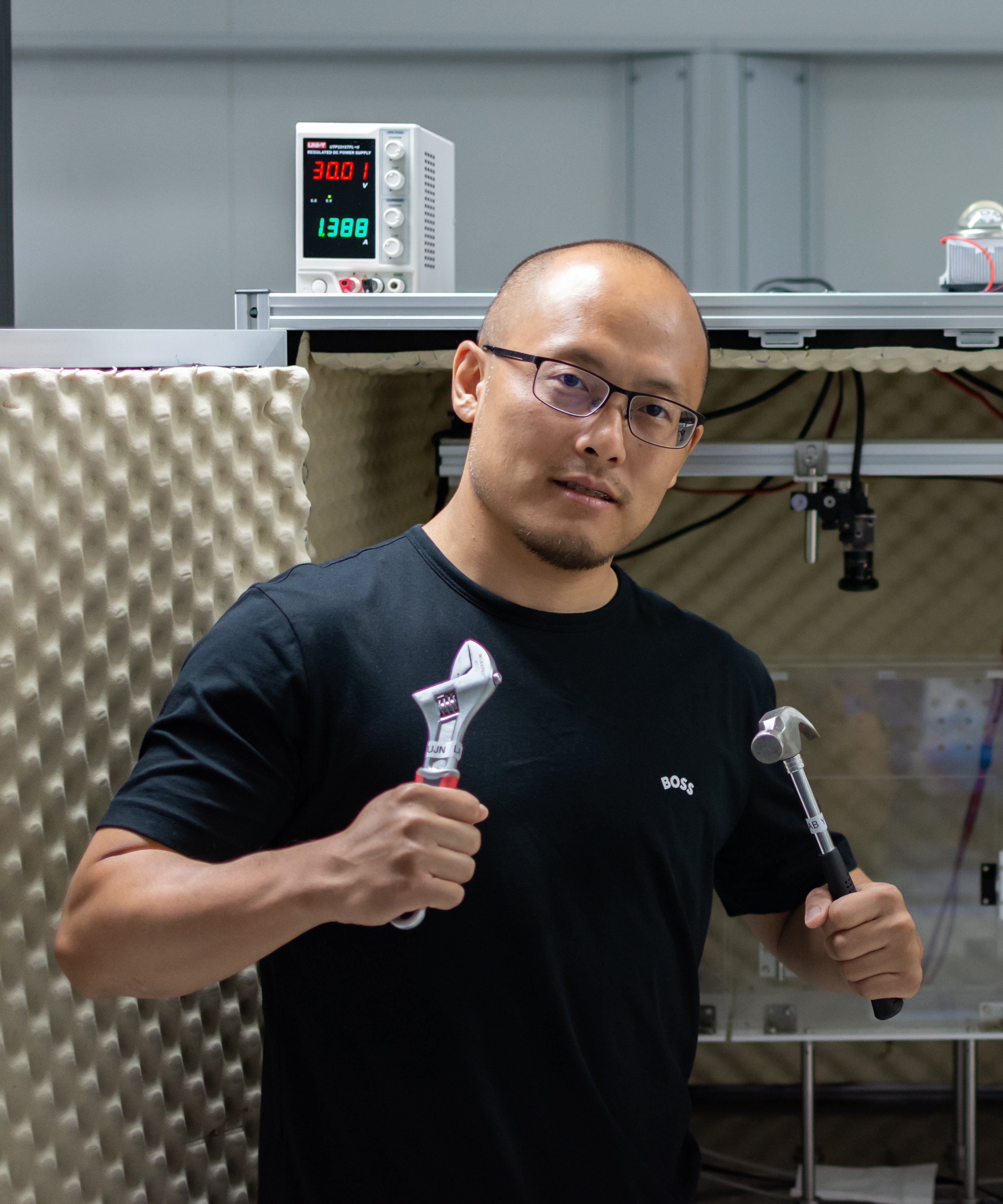Biography
“Those of us who do electrophysiological recording routinely will argue that there are few events as wondrous and exciting as listening to the sound of a live neuron speaking its own particular language and seeing this language as bursting electrical patterns flickering across the oscilloscope screen.”
–Rodolfo Llinas in `I of the Vortex: From Neurons to Self`
I started my neuroscience career by studying ion channels on retinal ganglion cells and also did circuit mapping on cortical slices. However, I am most interested in deciphering how single neurons integrate (or compute) synaptic inputs under in vivo condition. Through studying synaptic potentials in vivo, I hope to understand the transduction and transformation of neural signals in the neural circuits. For my Ph.D., I developed dual whole-cell patch-clamp recordings in cat visual cortex, which allowed me to observe synchronous high-frequency membrane-potential fluctuations in pairs of neurons in vivo. I also came up with an in vivo configuration where I stimulated a single simple cell while recording the membrane potential of a complex cell to test their connectivity. During my postdoc, I applied in vivo whole-cell recordings in head-fixed, task-performing mice, which led me to discovered reafference-driven inhibition in the barrel cortex during active tactile sensing and a feedforward mechanism for sensory gating. To understand the roles of diverse types of GABAergic inhibitory interneurons, I went on to record three major types of interneurons across layers of barrel cortex in behaving mice and revealed their specific temporal dynamics in behavior. In 2019, I joined the School of Life Sciences, IDG/McGovern Institute of Brain Research, and Center for Life Sciences at Peking University. My research now focuses on understanding mechanisms underlying cognitive control and movement generation.
Education
2006 - 2011, Ph.D., Neuroscience, Northwestern University
2004 - 2006, MSc, Anatomy and Neurobiology, Dalhousie University
1999 - 2003, BS, Fundamental Science, Tsinghua University
Professional Experience
2012 - 2019, Postdoc, Janelia Research Campus
Books and Book Chapter
Svoboda K and Yu J. (2018) Barrel Cortex. Handbook of Brain Microcircuits, pp. 59-66. Oxford University Press
Representative Peer-Reviewed Publications
Yu J, Hu H, Agmon A, Svoboda K. (2019) Recruitment of GABAergic Interneurons in the Barrel Cortex during Active Tactile Behavior. Neuron Oct 23;104(2):412-427.e4. doi: 10.1016/j.neuron.2019.07.027. Epub 2019 Aug 26.
Gutnisky D, Yu J, Hires SA, To MS, Bale MR, Svoboda K, Golomb D. (2017) Mechanisms underlying a thalamocortical transformation during active tactile sensation. PLoS Comput Biol. 7;13(6):e1005576.
Yu J*, Gutnisky D*, Hires SA, Svoboda K. (2016) Layer 4 fast-spiking interneurons filter thalamocortical signals during active somatosensation. Nature Neuroscience 19(12):1647-1657. (* equal contribution)
Hires SA, Gutnisky DA, Yu J, O`Connor DH, Svoboda K. (2015) Low-noise encoding of active touch by layer 4 in the somatosensory cortex. Elife 4:e06619.
Yu J, Ferster D. (2013) Functional coupling from simple to complex cells in the visually driven cortical circuits. Journal of Neuroscience 33(48):18855-66.
O`Connor DH, Hires SA, Guo ZV, Li N, Yu J, Sun QQ, Huber D, Svoboda K (2013) Neural coding during active somatosensation revealed using illusory touch. Nature Neuroscience 16(7):958-65.
Yu J, Ferster D (2010) Membrane potential synchrony in primary visual cortex during sensory stimulation. Neuron 68(6):1187-201.
Yu J, Daniels BA, Baldridge WH. (2009) Slow excitation of cultured rat retinal ganglion cells by activating group I metabotropic glutamate receptors. Journal of Neurophysiology 102(6):3728-39.
Yu J, Anderson CT, Kiritani T, Sheets PL, Wokosin DL, Wood L, Shepherd GM. (2008) Local-Circuit Phenotypes of Layer 5 Neurons in Motor-Frontal Cortex of YFP-H Mice. Frontiers in Neural Circuits 2008;2:6.
Weiler N, Wood L, Yu J, Solla SA, Shepherd GM. (2008) Top-down laminar organization of the excitatory network in motor cortex. Nature Neuroscience 11(3):360-6.
Hartwick AT, Bramley JR, Yu J, Stevens KT, Allen CN, Baldridge WH, Sollars PJ, Pickard GE. (2007) Light-evoked calcium responses of isolated melanopsin-expressing retinal ganglion cells. Journal of Neuroscience 27(49):13468-80.
Teaching
Behavioral Neuroscience: I cover topics related to using learned behaviors in animals to understand the neural substrates and mechanisms of cognition.
Data Science Fundamentals: This is practically a mathematical statistics course.
Frontiers in Neurobiology (seminar)
Undergraduate Thesis in Physiology and Neurobiology
Laboratory Introduction
Our lab is interested in understanding how cognitive signals influence motor outputs.
